Printed Material
Compiled by Martin Willey
Italy. First edition 1977. Second edition 1978, reprinted 1979.
Hardcover and softcover editions (13.5 x 19.5 x 1.5 cm).
AMZ also published novelisations by Gianni Padoan which are promoted on the back cover. AMZ was founded in Milan in 1954; the name based on the initials of the founders, Mario Abriani, Mario Malipiero and Francesco Zaccarini. It published children's books, often with licensed properties as well as general schools publishing. It was eventually taken over by De Agostini Editore, who still use AMZ brand for young children's books.
276 pages, all in colour. Diary covers September to June.
There are 11 initial pages for noting classes, teachers and exam results. September and June are given a page for two days, with no photos. At the end of each month a page is devoted to an advertisement for AMZ educational books.
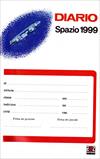
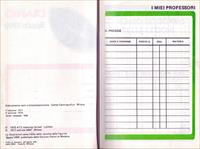
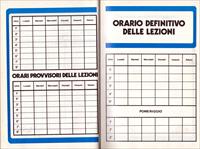
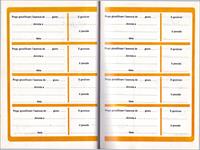
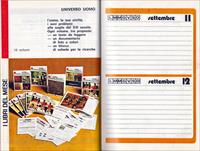
Between October and May there is one page per day, with a photo, text and diary lines. Each month is colour-coded. The series photos (233 in all, each 6.5 x 4.5 cm) are identical to the first series of Panini stickers. The texts and photos describe the series characters, then the episodes Breakaway, Earthbound, Black Sun, Matter Of Life And Death, Another Time Another Place, Force Of Life, Ring Around The Moon, Missing Link, Guardian Of Piri, Alpha Child and Voyager's Return. Some of the original Panini pictures are single pictures assembled from 2,4 or 6 stickers; here the larger pictures are skipped, or we see either one half or occasionally a more centred frame.
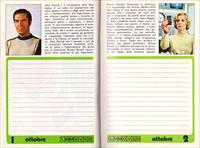
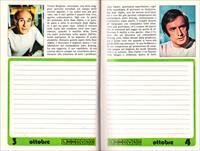
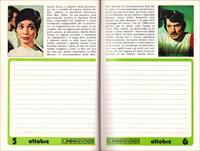
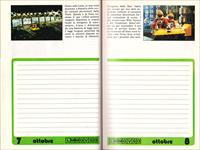
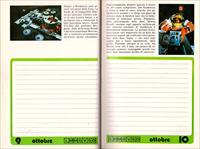
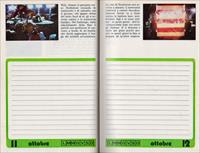
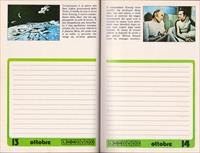
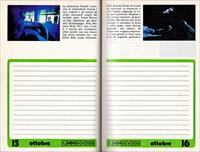
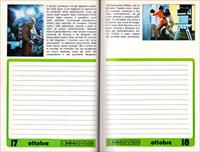
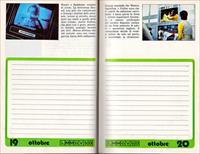
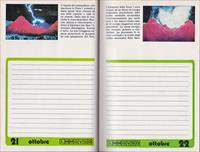
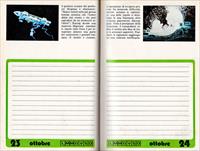
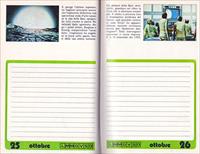
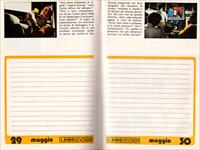
The last day of the year is December 23; it resumes on January 2 (with Alan's Eagle exploding on Terra Nova). May 1 is also missing (a holiday).
1200 lira.
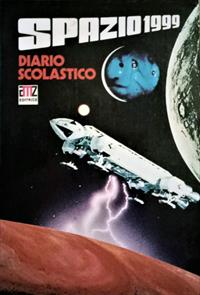
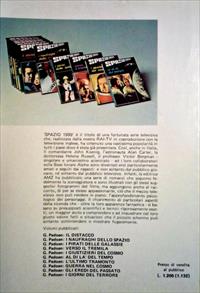
2000 lira. The hardcover edition adds the second series AMZ books
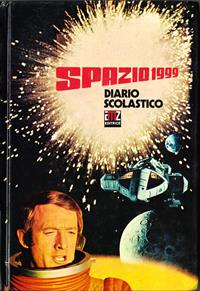
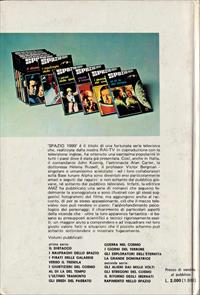
'SPAZIO 1999' il titolo di una fortunata serie televisiva che, realizzata dalla nostra RAI-TV in coproduzione con la televisione inglese, ha ottenuto una vastissima popolarita in tutti i paesi dove stata gia presentata. Cosi, anche in Italia, il comandante John Koenig, l'astronauta Alan Carter, la dottoressa Helena Russell, il professor Victor Bergman - singolare e umanissimo scienziato - ed i loro collaboratori sulla Base lunare Alpha sono diventati eroi particolarmente amati e seguiti dai ragazzi: e non soltanto dal pubblico giovane, nÚ soltanto dal pubblico televisivo. Infatti, la editrice AMZ ha pubblicato una serie di romanzi che seguono fedelmente la sceneggiatura e sono illustrati con gli stessi suggestivi fotogrammi del films; ma aggiungono anche al racconto, di per se stesso appassionante, cio che il mezzo televisivo non pub rendere in pieno: l'ap÷rofondimento psicologico dei personaggi; il chiarimento di particolari aspetti della vicenda che - oltre la loro apparenza fantastica - si basano su presupposti scientifici e tecnici rigorosamente esatti; un maggior aiuto a comprendere e ad inquadrare nel loro giusto valore fatti e situazioni che il piccolo schermo pub soltanto sottintendere o mostrare fugacemente.
'SPACE 1999' is the title of a successful television series which, produced by our RAI-TV in co-production with English television, has achieved vast popularity in all the countries where it has already been presented. Thus, as well as in Italy, the commander John Koenig, the astronaut Alan Carter, Dr. Helena Russell, Professor Victor Bergman - singular and very human scientist - and their collaborators on the Alpha Moon Base have become heroes particularly loved and followed by boys: and not only from young audiences, nor only from television audiences. In fact, the publisher AMZ has published a series of novels that faithfully follow the script and are illustrated with suggestive stills of the film; but they also add to the story, in itself exciting, what the television medium cannot fully render: the psychological insight into the characters; the clarification of particular aspects of the story which - beyond their fantastic appearance - are based on rigorously exact scientific and technical assumptions; a greater help to understand and to frame in their right value facts and situations that the small screen can only imply or show fleetingly.
Italy 1976-77
Distributed in "UPIM" supermarkets. Plain paper inside. Six cover designs, with two background colours, black or red. All photographs from Breakaway and Matter of Life And Death.
Information and pictures thanks to Stefano Guizzardi and Patrick Zimmerman
Poderose centrali nucleari hanno ormai risolto i problemi energetici sulla terra, ma la luna é diventata un pianeta esplosivo; infatti tutte le scorie radioattive vengono seppellite nelle sue viscere. La Base Alfa, con i suoi potenti laboratori, tiene la situazione sotto controllo, mentre le Aquile, moderne astronavi da ricognizione, trasportano i pericolosi materiali di scarto e mantengono i collegamenti con la terra. Tuttavia strani fenomeni di infezioni radioattive si diffondono tra gli astronauti e l'inquietudine comincia a serpeggiare...
Powerful nuclear power plants have now solved the energy problems on Earth, but the Moon has become an explosive planet; in fact all the radioactive waste is buried in its bowels. The Alfa Base, with its powerful laboratories, keeps the situation under control, while the Eagles, modern reconnaissance spaceships, transport the dangerous waste materials and maintain the connections with the Earth. However strange phenomena of radioactive infections spread among the astronauts and the anxiety begins to twist...
Mentioned in "The Making Of Space 1999" by Tim Heald. No further details known.
UK 1975 ??
Three designs with artwork covers (from the first three Hope jigsaw puzzles).
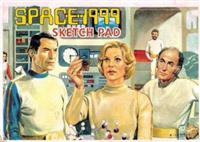
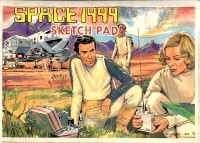
A5 notebook with artwork cover. There are two similar covers; both show a rescue Eagle launching, with two foreground astronauts. The interiors of both are identical (the covers are versions of the first two colouring pictures); the second cover is much rarer. Images thanks to Patrick Zimmerman.
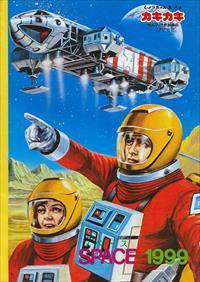
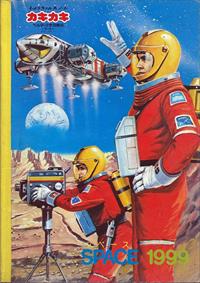
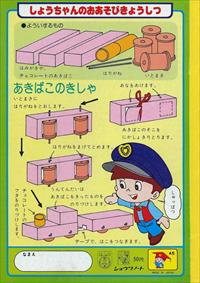
The binding is on the left, like western books, not on the right as per the traditional Japanese style. Other Showa notebooks use left or right. The back of most Showa notebooks shows some sort of activity project related to the title, but for Space: 1999 there are instructions to make a train.
The interior is 20 pages. Pages 3-17 are blank white pages. There are line art for colouring on 6 interior pages, at the front and end of the notebook: on the inside front and back cover, and both sides of the first and last pages (pages 1/2 and 19/20).
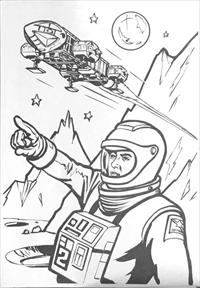
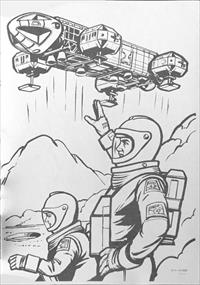
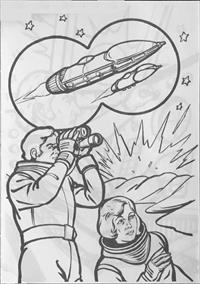
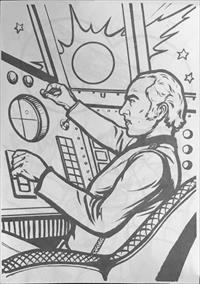
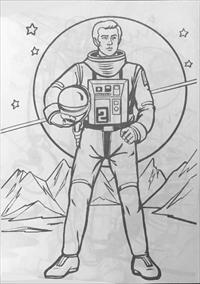
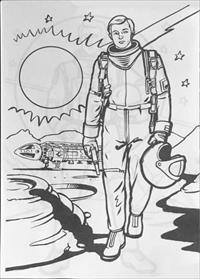
UK 1975 30p each
Both subtitled "The Ultimate Adventure Series", compiled by John Barraclough.
22 x 28 cm, folding out to 88 x 56 cm poster (reverse filled with publicity material, generously illustrated with colour photos)
US 1975
Saalfield Publishing Company of Akron, Ohio, were a children's publisher, formed in 1900. The company closed in 1977.
Simple art, though good covers. 21 x 27.5 cm. 49c each.
UK 1975-6
Sidney, John and Alfred Pemberton were second hand booksellers who started a publishing company, World Distributors (Manchester) Ltd in the 1950s. The publisher specialised in hard-cover children's annuals, establishing a British tradition which was still strong in the 1970s when they produced five Space 1999 annuals. In 1980 the company became World International Ltd, but the tradition of annuals was in sharp decline. By 1990 the company was defunct. Their assets were taken over in 1999 by Danish children's publisher Egmont.
| Title | Cover | Contents |
|---|---|---|
| COLOURING BOOK (SBN 7235 3313 X; pp52; 1975, 15p) | 20 x 29 cm, cover photos of astronauts in NDA 2, Eagle on pad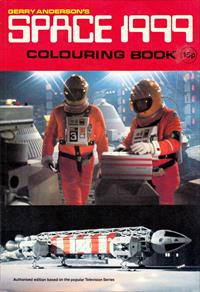
|
48 good drawings to colour. Artwork by Edgar Hodges, who also did the annual covers. 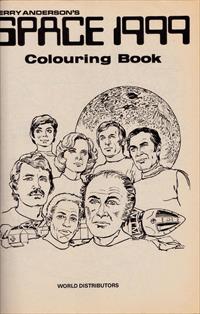
|
| ACTIVITY BOOK (SBN 7235 1758 4; pp52; 1976, 15p) | 20 x 29 cm, cover art of 2 astronauts in lunar hills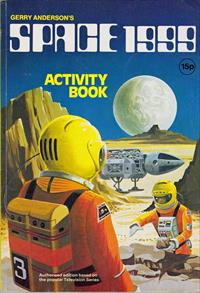
|
48 assorted colouring pages, dot to dot, mazes, simple word games. The art is simpler than the colouring book.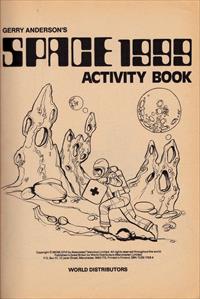
|
| COLOURING & ACTIVITY BOOK (SBN 7235 3343 1; pp80; 1976, 25p) | 20 x 29 cm, cover art of Koenig & Alan in suits, with rocketing Eagle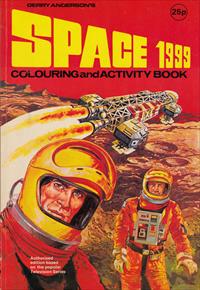
|
The Colouring Book, followed by the Activity Book |
| PRESS OUT BOOK (SBN 7235 2431 9; pp18; 1976, 20p, later 25p) | 21 x 30 cm, cover art of Eagle launching over astronauts, dome (the diorama scene)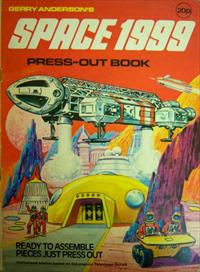
|
8 more simplistic colouring pages, card diorama to be pressed out & folded. Details |
| STICKER FUN BOOK (SBN 7235 2593 5; pp16; 1976, 20p) | 20.5 x 30 cm, cover art of Koenig in suit aiming heavy laser, Eagle launching beyond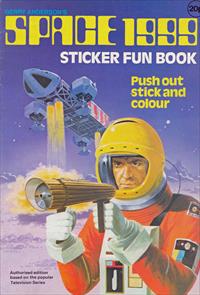
|
4 colouring pages (crude art of astronauts) with spaces for colour stickers from a central sheet to be applied. Last 4 pages are dot to dot, mazes, games. Details |
UK 1975, both 40p
"Super Action Heroes" series of Letraset's "Action Transfers". Letraset's dry-transfer lettering, invented in 1961, was the world-standard for artists and printers, and was used by the series art department for labels as well as special effects model detailing. In the mid-1960s they began to produce transfers for children; among them in 1968 were two Joe 90 picture books, written by E C Tubb. The transfers are typically figures (or vehicles) that are applied to the background by rubbing over the sheet. The Action Transfers brand started in 1969, with sets for historical themes, animals and adventure subjects. The Super Action Heroes range started in 1974, based around licensed television series. Their 1977 Star Wars sets were very popular, but in the 1980s interest declined. The division controlling the Action Transfer brand was sold off in 1981; the company was bankrupt by 1983.
Each of these were 29 x 20.5 cm cards which fold out to 44 x 20.5 cm artwork scene. Transfers are art of spacesuited Alphans (including Koenig, Helena, Victor) firing stun guns, their adversaries (androids or insect-men) and laser beams. The Eagles have orange command modules.
USA 1976
"Super Heroes come to life..." Includes 8 watercolour pens and 8 "pre-sketched numbered pictures". The packaging has a large logo, a picture of a child and the Gray Morrow painting from Charlton magazine number 1.
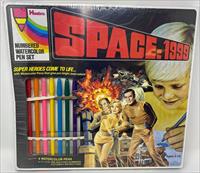
USA. 1978 or later.
Very cartoon-like art, including a strange upside down Eagle and the series logo amongst other science fiction craft from Star Wars and Battlestar Galactica, Japanese robots and pinball machines. Illustrated in The Gerry Anderson Memorabilia Guide (Dennis Nicholson) p233.
Japan. 1977. 600 Yen (about us$2)
Dimensions about 9" by 2". Four designs. All the Eagles are actually the Mattel Eagle and one design uses the cover art.
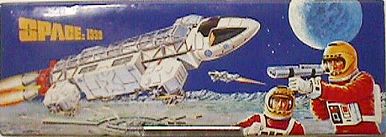 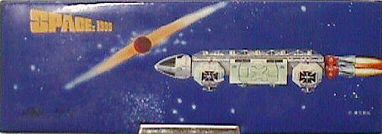 |
Eagle over Alpha, with astronaut with blaster (as Mattel Eagle box) |
 
|
Two astronauts in Eagle command module |
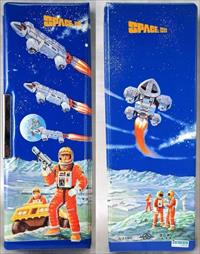 |
Three Eagles flying over lunar surface with astronaut and moonbuggy. |
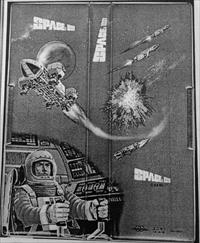
|
Hawks and Eagles with an inset of Koenig gripping the Eagle controls. |
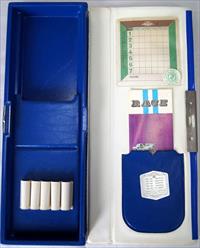
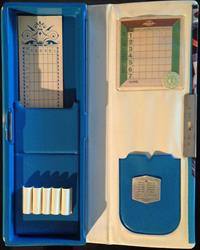
No. 310. Made in China, 1993.
Two plastic stencil sets including various science fact and fiction craft including a stylised Star Trek Enterprise, space shuttle and, on one set, a crude Eagle (with Metamorph boosters). Illustrated in The Gerry Anderson Memorabilia Guide (Dennis Nicholson) p328.
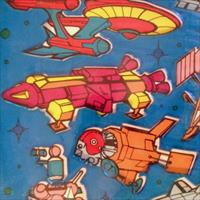
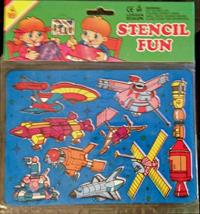
Japan
Approx 92 x 61 cm red and yellow print, with 3 designs:
US 1977-80, $2
Blueprints by Geoffrey Mandel (originally a supplement to Starlog 7)
Canada, 2001
High quality posters of an Eagle, by computer artist Richard Bergeron. The Eagle is a CGI model based on Daniel Prud'homme's accurate Eagle 2 CAD plans.
Online promotional images (from the original website, space1999eagle.com)
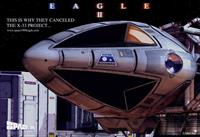
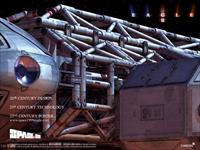
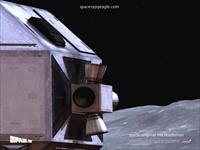
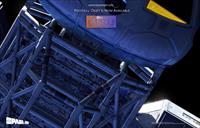
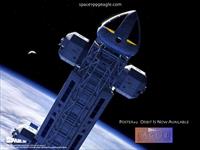
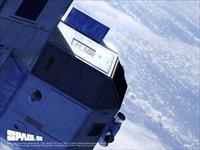
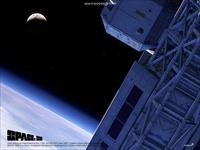
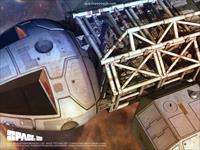
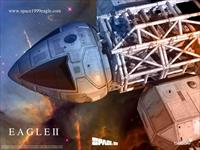
UK, September 2014. £12.99 each, £19.99 for both
Anderson Entertainment is a company run by Gerry Anderson's son, Jamie Anderson. It 2014 it agreed a merchandising license with ITV for Gerry Anderson's classic shows, including Space: 1999. These are sold online through their website.
The two posters are 59.4 x 84.1cm / 23.39 x 33.11 inches, on silk finish poster paper. They are photo/digital paintings by Eric Chu, an American artist who designed concepts for the Battlestar Galactica revival (2003-2009).
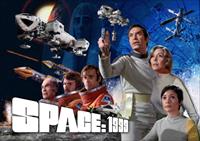
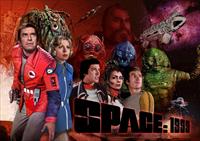
Copyright Martin Willey